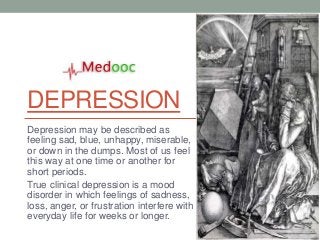
Depression
- 1. DEPRESSION Depression may be described as feeling sad, blue, unhappy, miserable, or down in the dumps. Most of us feel this way at one time or another for short periods. True clinical depression is a mood disorder in which feelings of sadness, loss, anger, or frustration interfere with everyday life for weeks or longer.
- 2. Causes, incidence, and risk factors • The exact cause of depression is not known. Many researchers believe it is caused by chemical changes in the brain. This may be due to a problem with your genes, or triggered by certain stressful events. More likely, it's a combination of both. • Some types of depression run in families. But depression can also occur if you have no family history of the illness. Anyone can develop depression, even kids. • The following may play a role in depression: • Alcohol or drug abuse • Certain medical conditions, including underactive thyroid, cancer, or long-term pain • Certain medications such as steroids • Sleeping problems.
- 3. Causes, incidence, and risk factors • Stressful life events, such as: • Breaking up with a boyfriend or girlfriend • Failing a class • Death or illness of someone close to you • Divorce • Childhood abuse or neglect • Job loss • Social isolation (common in the elderly)
- 4. Symptoms • Depression can change or distort the way you see yourself, your life, and those around you. • People who have depression usually see everything with a more negative attitude. They cannot imagine that any problem or situation can be solved in a positive way. • Symptoms of depression can include: • Agitation, restlessness, and irritability • Becoming withdrawn or isolated • Difficulty concentrating • Dramatic change in appetite, often with weight gain or loss • Fatigue and lack of energy • Feelings of hopelessness and helplessness • Feelings of worthlessness, self-hate, and guilt • Loss of interest or pleasure in activities that were once enjoyed • Thoughts of death or suicide • Trouble sleeping or too much sleeping
- 5. Signs and tests • Your health care provider will ask questions about your medical history and symptoms. Your answers and certain questionnaires can help your doctor diagnose depression and determine how severe it may be. • Blood and urine tests may be done to rule out other medical conditions with symptoms similar to depression.
- 6. Treatment • In general, treatments for depression include: • Medications called antidepressants • Talk therapy, called psychotherapy • If you have mild depression, you may only need one of these treatments. People with more severe depression usually need a combination of both treatments. It takes time to feel better, but there are usually day-to-day improvements. • If you are suicidal or extremely depressed and cannot function you may need to be treated in a psychiatric hospital. • MEDICATIONS FOR DEPRESSION • Drugs used to treat depression are called antidepressants. Common types of antidepressants include: • Selective serotonin re-uptake inhibitors (SSRIs), including fluoxetine (Prozac), sertraline (Zoloft), paroxetine (Paxil),fluvoxamine (Luv ox), citalopram (Celexa), and escitalopram (Lexapro). • Serotonin norepinephrine reuptake inhibitors (SNRIs), including desvenlafaxine (Pristiq), venlafaxine (Effexor), and duloxetine(Cymbalta). • Other medicines used to treat depression include: • Tricyclic antidepressants • Bupropion (Wellbutrin) • Monoamine oxidase inhibitors
- 7. CHANGES IN MEDICATION • Sometimes, medications that you take for another health problem can cause or worsen depression. Talk to your doctor about all the medicines you take. Your doctor may recommend changing your dose or switching to another drug. Never stop taking your medications without first talking to your doctor. • Women being treated for depression who are pregnant or thinking about becoming pregnant should not stop taking antidepressants without first talking to their doctor.
- 8. TALK THERAPY • Talk therapy is counseling to talk about your feelings and thoughts, and help you learn how to deal with them. • Types of talk therapy include: • Cognitive behavioral therapy teaches you how to fight off negative thoughts. You will learn how to become more aware of your symptoms and how to spot things that make your depression worse. You'll also be taught problem-solving skills. • Psychotherapy can help you understand the issues that may be behind your thoughts and feelings. • Joining a support group of people who are sharing problems like yours can also help. Ask your therapist or doctor for a recommendation.
- 9. OTHER TREATMENTS FOR DEPRESSION • Electroconvulsive therapy (ECT) is the single most effective treatment for severe depression and it is generally safe. ECT may improve mood in people with severe depression or suicidal thoughts who don't get better with other treatments. It may also help treat depression in those who have psychotic symptoms. • Transcranial magnetic stimulation (TMS) uses pulses of energy to stimulate nerve cells in the brain that are believe to affect mood. There is some research to suggest that it can help relieve depression. • Light therapy may relieve depression symptoms in the winter time. However, it is usually not considered a first- line treatment.